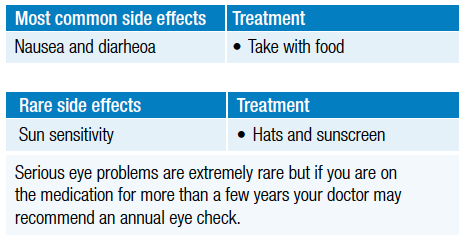Hydroxychloroquine (children)
What is it?
Hydroxycholoroquine (brand name: Plaquenil) is a medicine used to treat certain childhood rheumatic conditions (diseases which may affect joints, muscles, skin or eyes). It is most commonly used to treat lupus (also known as SLE).
Hydroxycholoroquine was originally designed to treat malaria. It is a medicine that works by suppressing the immune system. It reduces the damage done by inflammation, rather than just reducing pain. Because of this, it is called a disease modifying anti-rheumatic drug (DMARD). Other medicines in this group include leflunomide, methotrexate and sulfasalazine.
How will it help?
It is a drug that works slowly. It may take 2-3 months before you notice your child improving. It is often used in combination with other drugs to control the disease.
How is hydroxycholoquine given?
Hydroxycholoquine is given orally, one tablet daily.
What is the dose?
This depends on the size and weight of your child.
How long will it be used for?
It may be continued for many years particularly for treating lupus.
Are there any side effects?
Hydroxychloroquine is usually very effective in improving your child’s condition but, like all medicines, side effects can occur. Some are common, and some are rare. Most people don’t have any problems when they take hydroxychloroquine.

Things you need to know about this medicine
This medicine tastes bitter so it is best taken with food.
What to do if your child is sick
It is safe to give hydroxycholoquine even if your child has a fever or another illness.
Interactions
Hydroxycholoquine is generally safe with other medications.
Immunisations
Follow the normal immunisation schedule.
Infections
There is no increased risk of infections if your child is taking hydroxycholoquine. If your child is taking hydroxycholoquine you should see your paediatric rheumatologist regularly to make sure the treatment is working and to minimise any possible side effects.
This medicine suppresses the immune system. Keep it in a safe place as accidental overdose can be serious.
For more information see the Hydroxycholoquine (Paediatric) Information Sheet
This Information Sheet has been prepared using materials obtained from various sources which have been reviewed by the Australian Rheumatology Association (ARA). It contains general information only and does not contain a complete or definitive statement of all possible uses, actions, precautions, side effects or interactions of the medicines referenced. This information is not intended as medical advice for individual conditions nor for making an individual assessment of the risks and benefits of taking a particular medicine. Decisions regarding the assessment and treatment of patients are the sole responsibility of the treating medical professional, exercising their own clinical judgment and taking into account all of the circumstances and the medical history of the individual patient. ARA has used all reasonable endeavours to ensure the information on which this Information Sheet is based is accurate and up to date. However, the ARA accepts no responsibility or liability for the accuracy, currency, reliability and/or completeness of the information contained in this Information Sheet. To the maximum extent permitted by law, the ARA expressly disclaims any liability for any injury, loss, harm or damage arising from or in connection with use of and reliance on the information contained in this Information Sheet. This information sheet is copyright and may be reproduced in its entirety but may not be altered without prior written permission from the ARA.Page updated April 2024
Discover more...
-
Advocacy & policy
Arthritis Australia advocates to government, business, industry and community leaders to improve care, management, support and quality of life for people with arthritis..
-
10 steps for living well with arthritis
Here is our 10 steps checklist to help you live with arthritis.
-
Children and arthritis
Arthritis can happen at any age. Here, you can find management and treatment information specifically created for the more than 6,000 Australian children living with...
Sign up to Arthritis Insights
Regular updates, news and research findings delivered to your inbox: